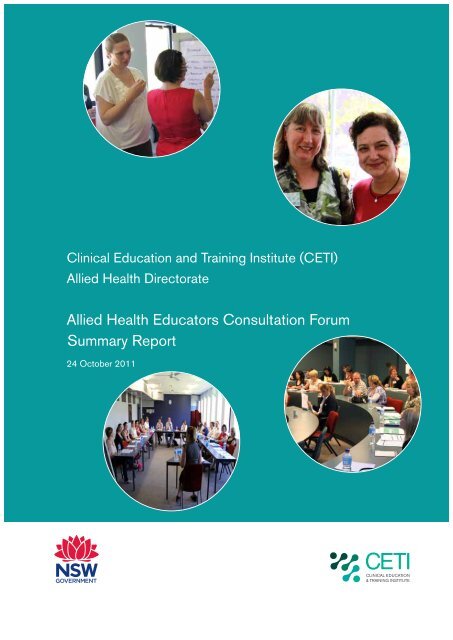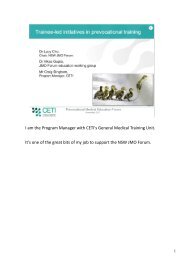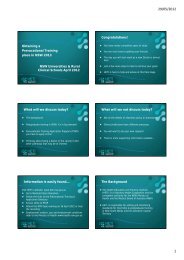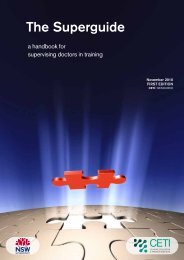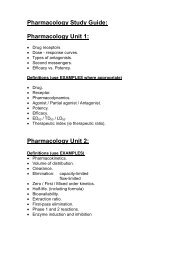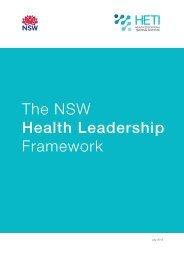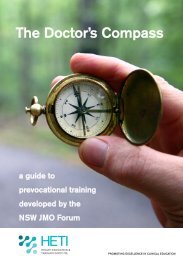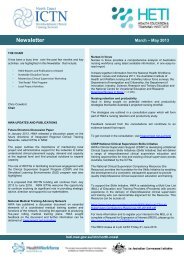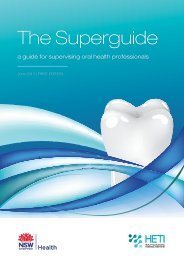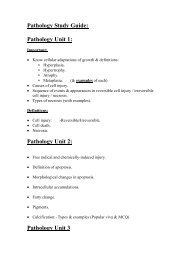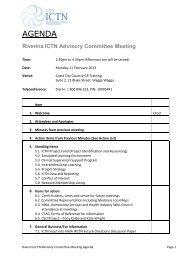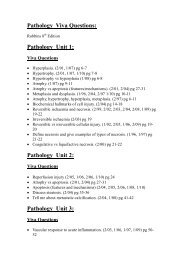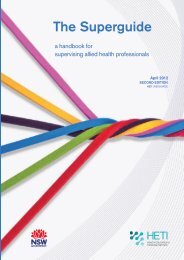Open - HETI - NSW Government
Open - HETI - NSW Government
Open - HETI - NSW Government
Create successful ePaper yourself
Turn your PDF publications into a flip-book with our unique Google optimized e-Paper software.
Clinical Education and Training Institute (CETI)<br />
Allied Health Directorate<br />
Allied Health Educators Consultation Forum<br />
Summary Report<br />
24 October 2011<br />
CLINICAL EDUCATION<br />
& TRAINING INSTITUTE
CLINICAL EDUCATION<br />
& TRAINING INSTITUTE<br />
<strong>NSW</strong> Clinical Education and Training Institute (CETI)<br />
Building 12<br />
Gladesville Hospital<br />
GLADESVILLE <strong>NSW</strong> 2111<br />
Tel. (02) 9844 6551<br />
Fax. (02) 9844 6544<br />
www.ceti.nsw.gov.au<br />
info@ceti.nsw.gov.au<br />
Post: Locked Bag 5022<br />
GLADESVILLE <strong>NSW</strong> 1675<br />
Suggested citation:<br />
Clinical Education and Training Institute. Allied Health Educators Consultation Forum Summary Report, 24 October 2011.<br />
Sydney: CETI, 2011.<br />
This work is copyright. It may be reproduced in whole or in part for study or training purposes subject to the inclusion of an<br />
acknowledgement of the source. It may not be reproduced for commercial usage or sale. Reproduction for purposes other<br />
than those indicated requires written permission from CETI.<br />
© CETI November 2011<br />
For further copies of this document, please contact CETI, or download a digital copy from the CETI website:<br />
www.ceti.nsw.gov.au
ALLIED HEALTH EDUCATORS CONSULTATION FORUM SUMMARY REPORT<br />
Executive Summary<br />
The Clinical Education and Training Institute’s (CETI) Allied Health Directorate held its first<br />
consultation forum with allied health professionals in designated education roles on the 24th<br />
October 2011. This report presents an overview of the discussions and key outcomes from the<br />
day. In addition it provides insight into the perspective of allied health professionals in designated<br />
education roles on the priority education and training needs for allied health professionals.<br />
Delegates attending were nominated by Local Health District (LHD) and Specialty Network Chief<br />
Executives.<br />
The key issues identified from the day include:<br />
• The need to recognise that education should be ‘core business’ for allied health<br />
• The varied and diverse nature and roles of allied health educator positions across the state<br />
• Enhanced investment in educators to build capacity for the delivery of allied health education,<br />
is considered an enabler to support professional development of staff and increase clinical<br />
placement capacity<br />
• Opportunities exist amongst educators to establish networks to collaborate and information<br />
share<br />
• Opportunities exist to establish stronger foundations for education, Continuing Professional<br />
Development (CPD), registration and supervision<br />
• Standards covering protected time could enhance engagement in education and training<br />
activities<br />
• Opportunities exist for allied health to engage more in Interprofessional Collaborative Practice<br />
(ICP) and promote interdisciplinary education and research<br />
• An allied health educator’s role can be enhanced through improved access: to resources;<br />
tools to harness formal and informal educational opportunities; collaboration between health;<br />
universities and VET sector; utilisation of existing networks; and, support and time to address<br />
the ‘educators’ educational learning needs<br />
• Allied health educators’ professional development needs include, but are not limited to, support<br />
for learning new technologies, evaluation skills, leadership and management, mentoring and<br />
teaching and establishment of formal education pathways.<br />
The forum discussion will inform the Allied Health Directorate’s activities over the next 12 months.<br />
By collaborating with our key stakeholders and the CETI Allied Health Advisory Committee, the<br />
Allied Health Directorate is working to support the delivery of clinical education and training so<br />
allied health have the necessary skills and knowledge to deliver high quality patient care for the<br />
people of <strong>NSW</strong>.
CLINICAL EDUCATION<br />
& TRAINING INSTITUTE<br />
Contents<br />
Background<br />
Forum Aims<br />
Overview of presentations<br />
Small group discussions<br />
Building capacity and governance<br />
Professional development needs of Allied Health Educators<br />
Consultation: Facilitating learning and teaching resource<br />
The way forward<br />
Appendix - list of attendees<br />
Appendix - references<br />
2<br />
2<br />
3<br />
7<br />
9<br />
10<br />
10<br />
11<br />
13<br />
14<br />
1
ALLIED HEALTH EDUCATORS CONSULTATION FORUM SUMMARY REPORT<br />
Background<br />
The Clinical Education and Training Institute (CETI) was established in <strong>NSW</strong> on 1 July 2010 as one<br />
of the four pillars of health reform resulting from the Special Commission of Enquiry into Acute Care<br />
in <strong>NSW</strong> Public Hospitals (Garling, 2008). CETI’s mission is to provide a central source of leadership<br />
and coordination in the area of clinical education and training to ensure all health professionals have<br />
the necessary skills and knowledge to deliver high quality and safe patient care to the people in<br />
<strong>NSW</strong>.<br />
The Allied Health Directorate has been established within CETI to lead and coordinate the clinical<br />
education and training needs of the 23 allied health professions and allied health support staff<br />
working within the <strong>NSW</strong> public health system. The Directorate’s aim is to build strong working<br />
relationships with key stakeholders to identify opportunities to build capacity and governance for<br />
education within existing resources, identify core competencies across disciplines, and develop<br />
frameworks, resources and standards to support the delivery of clinical education and training.<br />
At the first consultation forum held on the 20th of June 2011 with the Leaders in Allied Health, the<br />
need to address the skill development of educators was identified (CETI 2011). In response, and<br />
as part of the overall consultation process, the Allied Health Directorate organised a consultation<br />
forum on the 24th October 2011 at the Northern Sydney Education Centre with allied health<br />
professionals in designated education roles from 18 Local Health Districts (LHD) and Specialty<br />
Networks as nominated by Chief Executives. The aim of the forum was to identify the priority needs<br />
for allied health education and training, identify the professional development needs of allied health<br />
educators and provide a platform for networking and information sharing. The forum consisted of<br />
short presentations from the Allied Health Directorate followed by small group discussions. The key<br />
themes and outcomes of the day have been summarised in this report.<br />
Participants acknowledged that across the allied health professions, significant variation and<br />
diversity of allied health professionals working in the area of education and training exists. Whilst<br />
there are a number of allied health educators (either discipline specific or interprofessional) in<br />
designated roles currently employed within <strong>NSW</strong> Health, there are also some not in designated<br />
roles, but were nominated to attend by Local Health Districts and Specialty Networks for their<br />
involvement in allied health education and training. Therefore the word ‘clinical educator’ may<br />
not necessarily reflect the scope and diversity of the roles represented at the forum and further<br />
consultation and engagement with this stakeholder group will continue.<br />
Forum Aims<br />
• To consult with allied health professionals in designated education roles about building capacity<br />
for education and training for allied health<br />
• To identify the professional development needs of allied health professionals in designated<br />
education roles<br />
• To consult regarding the development of teaching and learning resource for allied health<br />
clinicians<br />
• To provide a platform for networking and information sharing.<br />
2
CLINICAL EDUCATION<br />
& TRAINING INSTITUTE<br />
Overview of Presentations<br />
Introduction and update on the<br />
CETI Allied Health Directorate<br />
Daniella Pfeiffer<br />
Learning and Teaching Coordinator<br />
CETI Allied Health Directorate<br />
With the establishment of the CETI Allied<br />
Health Directorate, there is a unique<br />
opportunity to harness the innovation and<br />
goodwill that exists within allied health to<br />
establish solid foundations, sustainable<br />
infrastructure and frameworks for allied<br />
health education and training across <strong>NSW</strong>.<br />
The role of the Directorate is therefore<br />
strategic, not operational, and will build on<br />
the existing good work that’s being done by<br />
very experienced and dedicated clinicians,<br />
managers and leaders in the Local Health<br />
Districts and Specialty Networks.<br />
By beginning with focusing on what is core<br />
and common across the 23 allied health<br />
professions, there is opportunity to harness<br />
existing ‘ad hoc’ approaches, identify<br />
core and common skills and facilitate the<br />
development of shared resources and<br />
learning.<br />
The CETI Allied Health Directorate was established on the 2nd of May 2011 with the appointment<br />
of two Learning and Teaching Coordinators. This is the first time in <strong>NSW</strong> that allied health has had<br />
access to a central and coordinated point to provide leadership in clinical education and training.<br />
To date, the Directorate has focused on the establishment of the CETI Allied Health Advisory<br />
Committee, the publishing of The Superguide: a handbook for supervising allied health<br />
professionals and consultation with key stakeholders regarding the education and training needs for<br />
allied health.<br />
The consultation process, including this forum, is pivotal in shaping the Directorates strategic plan.<br />
3
ALLIED HEALTH EDUCATORS CONSULTATION FORUM SUMMARY REPORT<br />
Thinking differently about<br />
education and training<br />
Jacqueline Dominish<br />
Learning and Teaching Coordinator<br />
CETI Allied Health Directorate<br />
This presentation provided a brief overview<br />
of the contemporary approaches to adult<br />
education and invited forum participants<br />
to think beyond the training room when<br />
considering the delivery of education to<br />
allied health professionals.<br />
Contemporary approaches to adult<br />
education (Billet 1999; Manley 2009)<br />
suggest that:<br />
• Learning can happen at anytime<br />
• The majority of learning occurs<br />
informally through everyday thinking<br />
and acting<br />
• Learning is an active process (rather<br />
than a passive process)<br />
• Learning is a social process facilitated<br />
through interactions with colleagues<br />
within workplaces, networks or in the<br />
home environment.<br />
Some of the most valuable learning and<br />
teaching experiences can occur as part<br />
of everyday duties such as, supervision<br />
or reflective practice and by harnessing<br />
these activities as learning and teaching<br />
‘moments’, there is an opportunity to<br />
advance the skills and knowledge of the<br />
allied health workforce through work based<br />
learning.<br />
4
CLINICAL EDUCATION<br />
& TRAINING INSTITUTE<br />
Work based learning, defined as an<br />
approach that can “enable workplace<br />
transformation to be achieved and<br />
sustained by ensuring that workplace<br />
activity is the driver of learning and<br />
development” (Manley et al 2009; p88)<br />
is a concept that moves away formal<br />
education conducted in a training<br />
room, reliant on one expert to impart<br />
knowledge and valuing research alone,<br />
to also appreciating and valuing the<br />
collective knowledge of individuals and<br />
the dynamic process of practice based<br />
learning.<br />
In line with current global health<br />
education reforms, which calls for<br />
health professionals to meet the<br />
healthcare needs of the population<br />
through transformative learning, there<br />
are increased expectations on health<br />
professionals to participate in lifelong<br />
learning and shared learning, that is to<br />
learn from, with and about each other,<br />
to achieve positive outcomes in patient<br />
care (Frenk et al 2010; WHO 2011).<br />
Opportunities to facilitate shared learning<br />
include networking, collaborative work,<br />
sharing information and resources within<br />
and across disciplines.<br />
Communities of practice (Lave &<br />
Wenger, 1991) in particular can facilitate<br />
learning as a process of engagement<br />
and connection with colleagues and<br />
professions through collectively managing<br />
knowledge, constructing meaning, sharing<br />
practices and interpreting this within work<br />
environments (Imel 2000).<br />
5
ALLIED HEALTH EDUCATORS CONSULTATION FORUM SUMMARY REPORT<br />
The CETI Allied Health Directorate will be<br />
aiming to facilitate some of this shared<br />
learning by:<br />
• Creating connections across<br />
professional, organisational and<br />
geographic boundaries<br />
• Considering people as the building<br />
blocks for education<br />
• Capitalising on the wisdom<br />
and experiences of allied health<br />
professionals as members of our<br />
community of practice<br />
• Encouraging learning as a process of<br />
participation among our colleagues.<br />
6
CLINICAL EDUCATION<br />
& TRAINING INSTITUTE<br />
Small Group Discussions<br />
Small group discussions focused on:<br />
• Current strengths and opportunities<br />
• Building capacity and governance<br />
• Identifying professional development needs of educators<br />
• Resource development<br />
Current Strengths and Opportunities<br />
Participants were asked to identify what the current strengths and opportunities are for allied<br />
health professionals in designated education roles.<br />
In terms of strengths, there was overall recognition that education should be ‘core business’ for<br />
allied health particularly with the introduction of national professional registration through AHPRA.<br />
Strengths were also seen as opportunities to harness, invest and improve on the status quo by<br />
way of the following:<br />
Educators<br />
Student Education<br />
Networking<br />
Strengths<br />
There have been some designated<br />
educator positions created such as<br />
funded pharmacy positions through<br />
the Garling Inquiry or as an outcome<br />
of the Health Professionals Award<br />
translation.<br />
Where student educator positions<br />
exist, allied health supervisors are<br />
supported in facilitating the clinical<br />
placement experience including<br />
formal education and orientation.<br />
The establishment of the Child<br />
Health Network and the <strong>NSW</strong><br />
Health Area Pharmacy Educators<br />
Network are examples of effective<br />
cross geographical and/or discipline<br />
networks for information sharing and<br />
collaborative practice.<br />
Opportunities<br />
As these positions are limited,<br />
dispersed and varied across<br />
LHDs and Specialty Networks,<br />
more investment in designated<br />
allied health educator roles is<br />
necessary.<br />
Further investment would<br />
be considered an enabler<br />
to supporting an increase in<br />
clinical placement capacity and<br />
developing skills of clinicians to<br />
make the best use of students<br />
while on clinical placement to<br />
support delivery of patient care.<br />
Further opportunities to meet<br />
regularly, share information<br />
and establish cross discipline<br />
networks for education were<br />
identified. Suggestions were<br />
made to use the forum as<br />
a platform for establishing<br />
networks for collaboration<br />
amongst educators.<br />
7
ALLIED HEALTH EDUCATORS CONSULTATION FORUM SUMMARY REPORT<br />
Strengths<br />
Opportunities<br />
Information Use of available technology Opportunities were identified to<br />
Technology<br />
including <strong>NSW</strong> Health<br />
online learning opportunities<br />
(e.g. “GEM”, Centre<br />
for On-line Learning),<br />
teleconferencing and<br />
other information sharing<br />
platforms established in<br />
LHDs.<br />
enhance CPD and other teaching and<br />
learning activities through information<br />
technology such as web portals,<br />
cross district information sharing<br />
platforms and list serves. A major<br />
barrier identified to harnessing these<br />
opportunities is access to technology,<br />
physical infrastructure and variance<br />
across LHDs in use of IT software,<br />
platforms etc.<br />
Governance<br />
Core and Common<br />
Disciplines with professional<br />
registration standards can<br />
provide structure for CPD<br />
and supervision.<br />
Allied Health is increasingly<br />
identifying what is common<br />
across all the allied health<br />
professions such as<br />
supervision, handover and<br />
communication.<br />
Opportunity exists to establish robust<br />
systems of governance and standards<br />
for allied health education within LHDs<br />
to build on mandatory requirements<br />
for registration including CPD as<br />
outlined by AHPRA, national priorities<br />
as identified by Health Workforce<br />
Australia, outcomes of the Garling<br />
Inquiry and creation of CETI as a<br />
central agency to provide leadership in<br />
education and training.<br />
From this work, opportunities exist for<br />
allied health to develop a collective<br />
voice, around the needs of allied health<br />
education and training in <strong>NSW</strong> Health.<br />
Working within the<br />
interprofessional<br />
space<br />
Linking to and learning from<br />
other professions (such<br />
as nursing and medicine)<br />
who have well-established<br />
education systems.<br />
Opportunities exist for allied health to<br />
work in the space of Interprofessional<br />
Collaborative Practice (ICP) and<br />
promote interdisciplinary education and<br />
research<br />
Supporting Rural Pockets of innovation exist Opportunities exist to address specific<br />
Education<br />
between <strong>NSW</strong> Health,<br />
Learning & Development<br />
and Universities to fund<br />
educator positions in rural<br />
settings.<br />
issues impacting on a rural clinician to<br />
access education and training.<br />
8
CLINICAL EDUCATION<br />
& TRAINING INSTITUTE<br />
Building Capacity and Governance<br />
Participants were asked to consider opportunities to build capacity for education and training of<br />
staff in LHD and Specialty Networks. Participants identified a number of key elements to support<br />
such work:<br />
Resources<br />
• Stocktake of resources -What do we have? How do we use it?<br />
• Identifying and using existing resources and networks (e.g. professional bodies, universities)<br />
• Avoiding duplication -modify existing resources<br />
• Harnessing teleconferencing and simulation resources<br />
Collaboration between LHDs and stakeholders<br />
• Providing access to resources (common website/platform to store and share resources and<br />
minimize duplication, share success stories of business cases where resource funding was<br />
obtained, set standards around intellectual property so materials can be shared)<br />
• Consistency of mandatory training and access to records across LHDs and Speciality Networks<br />
• Utilisation of existing networks to promote and support interdisciplinary research<br />
• Improving utilisation of IT (e.g. CIAP, webcasting, support and access)<br />
• Linking with universities and TAFE<br />
Student education<br />
• Better collaboration between universities and <strong>NSW</strong> Health to improve the experience for<br />
students on placement<br />
• University funding for placements could lead to protected teaching time<br />
• Identifying opportunities for conjoint appointments/funded educator positions with universities<br />
to support student clinical placements<br />
Management support<br />
• Collaboration with CETI and other sectors inside/outside of <strong>NSW</strong> Health to advocate for the<br />
needs of allied health<br />
• Development of best practice tools to support education and training<br />
• Improving local governance standards (e.g. CPD as a standing agenda item at team meetings)<br />
Develop culture of lifelong learning<br />
• Promoting importance of contributing to CPD<br />
• Developing educational skills of clinical staff<br />
• Facilitating efficient transfer of information and shared learning between practitioners<br />
• Harnessing informal education (e.g. email chat groups, communities of practice, sharing via<br />
social media)<br />
Educator support<br />
• Opportunities to further develop skills and qualifications (e.g. Graduate Certificate in Adult<br />
Education)<br />
• Protected time for their own education needs<br />
9
ALLIED HEALTH EDUCATORS CONSULTATION FORUM SUMMARY REPORT<br />
Professional Development Needs of Allied Health Educators<br />
Participants were asked to consider the professional development needs for allied health<br />
professionals in designated education roles. Priority areas identified were:<br />
• Clinical Supervision<br />
• Support for use of new technologies to facilitate education<br />
• Development of non-clinical skills specifically leadership, change management, project<br />
management, strategic and business planning<br />
• Coaching and mentoring<br />
• Learning and skills development in simulation<br />
• Teaching patient centred approach, learning from patient experience<br />
• How to align work with strategic directions (e.g.10 year workforce plan report, Learning and<br />
Development strategic plan).<br />
• Ability to describe how allied health value adds<br />
• Evaluation skills including measuring the impact of education through patient outcomes (input/<br />
outcome with patient)<br />
• Formal postgraduate qualifications, formal education pathways (linked to position) and support<br />
to attend (e.g. Cert IV, Grad Cert or Masters)<br />
• Teacher training<br />
- Facilitative skills for adult learning<br />
- Transfer of knowledge<br />
- Communication<br />
- Interprofessional education<br />
Consultation: Facilitating Learning and Teaching Resource<br />
The CETI Allied Health Directorate in collaboration with the CETI Allied Health Advisory Committee<br />
is exploring development of a resource for allied health clinicians to increase skills and confidence<br />
in facilitating clinical teaching, learning and education in the workplace. Participants were asked to<br />
brainstorm what topics should be covered in such a resource that would be of value to clinicians at<br />
the point of care.<br />
Facilitating Learning<br />
• Learning styles and ways to approach them<br />
• Learning needs analysis<br />
• Engagement in learning / ways of engaging people creatively<br />
• Making learning accessible<br />
• Scenario or problem base learning<br />
• Shared language on clinical reasoning<br />
Different models of education<br />
• How to present different modalities of teaching<br />
• Creative learning environments<br />
• Appropriate teaching approaches<br />
10
CLINICAL EDUCATION<br />
& TRAINING INSTITUTE<br />
• Modular approach to education – bite size approach<br />
• Competency based learning<br />
• Understanding common terms (curriculum)<br />
• Using a Root Cause Analysis (RCA) to facilitate teaching<br />
Tools<br />
• Useful websites<br />
• Checklist of procedures for educators<br />
• How to use equipment for education<br />
• Complementary resources (DVDs, activities)<br />
Skills<br />
• How to facilitate reflective practice<br />
• Listening and communication skills<br />
• Giving feedback to affect change<br />
• Tips for how to facilitate clinical reasoning<br />
• Conflict resolution<br />
• Working with and facilitating groups<br />
• Running a workshop – steps and principles<br />
• Facilitating role plays<br />
• Writing case studies/scenarios<br />
• Drawing out opinions<br />
Evaluation of learning<br />
• How to evaluate or get meaningful feedback<br />
Other<br />
• Consideration of intellectual property to facilitate sharing<br />
• How to be a good mentor<br />
• Teaching in different locations e.g. metro, rural areas<br />
• Becoming a flexible educator – adapting to the situation<br />
• Continuation of learning from novice to intermediate to experienced<br />
• Facilitating links for networking to other like professions<br />
The above information will be presented to the CETI Allied Health Advisory Committee to inform the<br />
development of a resource for clinicians.<br />
The way forward<br />
The feedback obtained from this forum will inform the development of the CETI Allied Health<br />
Directorate’s activities over the next 12 months. Further consultation with key stakeholders is<br />
planned. In particular, the Allied Health Directorate recognises that allied health educators play a<br />
vital role in the delivery and coordination of effective education to the allied health workforce. With<br />
feedback obtained at this forum, the CETI Allied Health Directorate will be aiming to support allied<br />
health educators and clinicians by:<br />
11
ALLIED HEALTH EDUCATORS CONSULTATION FORUM SUMMARY REPORT<br />
• Creating connections across professional, organisational and geographic boundaries<br />
• Identify ways to support the professional development needs of allied health educators<br />
• Using the feedback to inform the development of a user friendly guide for clinicians to facilitate<br />
learning in the workplace.<br />
By collaborating with our key stakeholders, the Allied Health Directorate is working to meet the<br />
clinical education and training needs of “staff on the ground” to support the delivery of high quality<br />
care for the people of <strong>NSW</strong>. The CETI Allied Health Directorate greatly appreciates the feedback,<br />
ideas and suggestions provided by the participants of this consultation forum.<br />
Top left :Tanya Farnham, Rebecca Lee, David Cross<br />
Top right: Stella Suen, Melinda Yeung<br />
Middle left: Gaynor Heading, Justin Scanlan<br />
Middle right: Carmel Blayden, Sonia Hughes, Craig Suosaari, Meg Wemyss<br />
Bottom left: Marie Heydon, Grainne O’Loughlin, Jacqueline Dominish<br />
Bottom right: Allison Ferguson, Jennifer Nichol<br />
12
CLINICAL EDUCATION<br />
& TRAINING INSTITUTE<br />
Appendix - List of Attendees<br />
Name Position Organisation<br />
Allison Ferguson Site Senior Dietician Illawarra Shoalhaven LHD<br />
Amy Hill A/- Integrated care coordinator Northern <strong>NSW</strong> LHD<br />
Anita Compton Senior Therapist Forensic Mental Health<br />
Specialty Network<br />
Ann Carter Pharmacy Educator Northern Sydney LHD<br />
Carmel Blayden Allied Health Educator Western Child Health Network<br />
Cathy Martin Pharmacy Educator Hunter New England LHD<br />
Cindy Patterson Pharmacy Educator Murrumbidgee LHD<br />
Claire Brunero Speech Pathologist Far West LHD<br />
Craig Suosaari Speech Pathologist Mid North Coast LHD<br />
David Cross Physiotherapy Adviser Western <strong>NSW</strong> LHD<br />
Elisabeth Long Social Work Educator South Eastern Sydney LHD<br />
Glen Auld Physiotherapist Central Coast LHD<br />
Grainne O’Loughlin Director of Allied Health St Vincent’s Health Network<br />
Jane McQueen Social Work Educator Nepean Blue Mountains LHD<br />
Jennifer Nichol Allied Health Educator Greater Eastern Child Health<br />
Network<br />
Joanne Rimington Pharmacy Educator South Eastern Sydney LHD<br />
Justin Scanlan Senior Occupational Therapist Sydney LHD<br />
Kate Symonds Pharmacy Educator Western <strong>NSW</strong> LHD<br />
Laurie-Anne Minslow Speech Pathologist Central Coast LHD<br />
Lil Vrklevski Psychologist Justice Health<br />
Marie Heydon Social Worker St Vincent’s Health Network<br />
Margot Brink Senior Social Worker Forensic Mental Health<br />
Specialty Network<br />
Meagan Lines Medical Radiation Sciences Educator Northern Sydney LHD<br />
Meg Wemyss Allied Health Educator Sydney Children’s Hospitals<br />
Speciality Network - Randwick<br />
Megan Kurtz Physiotherapist Southern <strong>NSW</strong> LHD<br />
Melinda Yeung Pharmacy Educator Western Sydney LHD<br />
Miriam Johnston Allied Health Educator South Western Sydney LHD<br />
Nicola Riley Dietitian Clinical Educator Sydney LHD<br />
Pauline Mendes Speech Pathologist Southern <strong>NSW</strong> LHD<br />
Rebecca Lee Physiotherapy Educator Western Sydney LHD<br />
Shelley Crowther Pharmacy Educator Illawarra Shoalhaven LHD<br />
Sheridan Collins Senior Dietician Sydney Children’s Hospitals<br />
Specialty Network - Westmead<br />
Sonia Hughes Allied Health Educator Northern Child Health Network<br />
Stella Suen Pharmacy Educator Nepean Blue Mountains LHD<br />
13
ALLIED HEALTH EDUCATORS CONSULTATION FORUM SUMMARY REPORT<br />
List of attendees continued<br />
Name Position Organisation<br />
Sue Steele-Smith<br />
Education Consultant<br />
and Manager, Royal<br />
Rehabilitation College<br />
Royal Rehabilitation Centre,<br />
Sydney<br />
Tanya Farnham Deputy/Physio Educator South Western Sydney LHD<br />
Dr Gaynor Heading General Manager CETI<br />
Jacqueline Dominish<br />
Learning and Teaching<br />
Co-ordinator<br />
CETI Allied Health<br />
Directorate<br />
Daniella Pfeiffer<br />
Dr Rob Wilkins<br />
Danielle Byers<br />
Learning and Teaching<br />
Co-ordinator<br />
Learning and Teaching<br />
Co-ordinator<br />
Learning and Teaching<br />
Co-ordinator<br />
Lisa Parkes Executive Assistant CETI<br />
CETI Allied Health<br />
Directorate<br />
CETI Interprofessional Practice<br />
Unit<br />
CETI Interprofessional Practice<br />
Unit<br />
Appendix - References<br />
Billet, S. 1999, ‘Guided Learning at Work’ in Understanding Learning at Work, eds. D. Boud & J.<br />
Garrick, Routledge, London and New York.<br />
Clinical Education and Training Institute 2011 CETI Allied Health Directorate Future Directions<br />
Report available for downloading on CETI website http://www.ceti.nsw.gov.au/allied-health-futuredirections-report/w1/i1008112/<br />
Frenk, J et al. 2010, Health professionals for a new century: transforming education to strengthen<br />
health systems in an interdependent world, The Lancet, vol. 376, 4 December 2010, pp.1923<br />
1958.<br />
Garling, P. 2008, Final report of the Special Commission of Inquiry: Acute Care Services in <strong>NSW</strong><br />
Public Hospitals. Sydney: <strong>NSW</strong> <strong>Government</strong> - Cited Oct 2011: http//lawlink.nsw.gov.au/lawlink/<br />
Special_Projects/11_splprojects.nsf/pages/acsi_finalreport.<br />
Imel, S. 2000, ‘Contextual Learning in Adult Education’ Practice Application Brief No. 12, ERIC<br />
Clearinghouse on Adult, Career and Vocational Education.<br />
Lave, J. & Wenger, E. 1991, Situated Learning: Legitimate Peripheral Participation. Cambridge<br />
University Press, New York.<br />
Manley et al. 2009, ‘Work-based learning in the context of contemporary health care education and<br />
practice: A concept analysis’ in Practice Development in Health Care 8(2) 87-127.<br />
World Health Organisation 2011, Transformative scale up of health professional education: An effort<br />
to increase the numbers of health professionals and to strengthen their impact on population health,<br />
viewed on 11 October 2011, http://www.who.int/hrh/resources/transformative_education/en/index.<br />
html<br />
14
CLINICAL EDUCATION<br />
& TRAINING INSTITUTE
ALLIED HEALTH EDUCATORS CONSULTATION FORUM SUMMARY REPORT
CLINICAL EDUCATION<br />
& TRAINING INSTITUTE<br />
<strong>NSW</strong> Clinical Education<br />
and Training Institute (CETI)<br />
Building 12<br />
Gladesville Hospital<br />
GLADESVILLE <strong>NSW</strong> 2111<br />
Tel: (02) 9844 6551<br />
Fax: (02) 9844 6544<br />
www.ceti.nsw.gov.au<br />
info@ceti.nsw.gov.au<br />
Post: Locked Bag 5022<br />
GLADESVILLE <strong>NSW</strong> 1675


